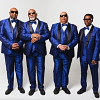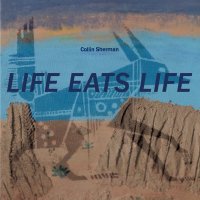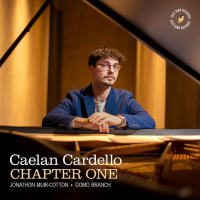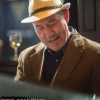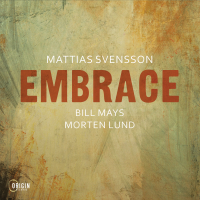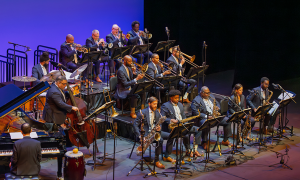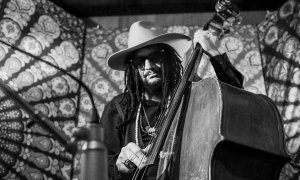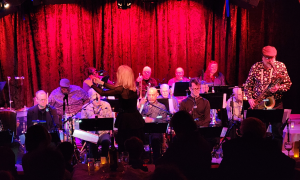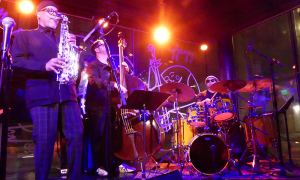Home » Jazz Articles » Live Review » The Blind Boys of Alabama at Miner Auditorium
The Blind Boys of Alabama at Miner Auditorium
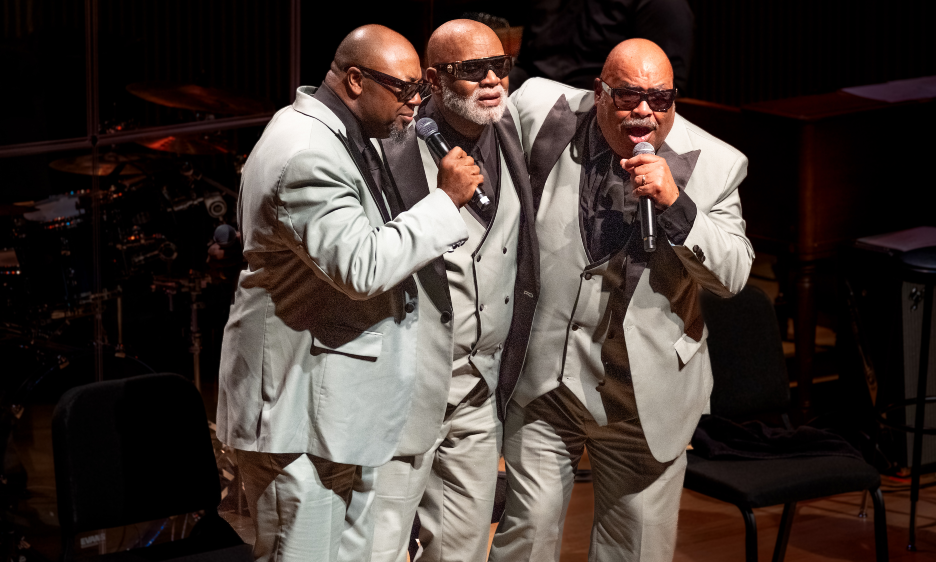
Courtesy Steve Roby
Miner Auditorium
San Francisco, California
September 7, 2025
It was the kind of Sunday afternoon that settles on a room like a benediction. Folks looked as if they'd come straight from church—pressed jackets, careful shoes, a woman down front wearing a black sweater stitched with the word "FAITH," the letters bright with sequins that caught every glint of stage light. The musicians would add the rest.
Cory Henry opened alone at the Yamaha, unhurried, talking as much as playing, the way people do when they're in no rush to leave a porch. He said he'd been making music since he was two—his mother, a choir director, taught him his first song—and you could hear both the discipline and the joy in the way he let a hymn breathe. He asked us to tap our toes "until your feet go numb," shake our shoulders, and let the music move us where it wanted. When someone shouted, "What's your name?" he laughed and improvised a tune on the spot—"My Name Is Cory Henry"—a gospel tune with a wink, his left foot leaning on a pedal that hit a small bass drum to push the backbeat along. He kept it to forty-five minutes, stories braided to songs, the last notes leaving a quiet expectancy in their wake.
Then The Blind Boys of Alabama were led onstage, one behind the other, arms set on one another's shoulders, careful and sure. They found their chairs the way they have discovered stages for most of a century—by trusting each other. Green suits with black lapels, black shirts and ties, shoes polished to a shine you could practically feel. The room rose to meet them before a word was sung.
Six GRAMMYs, including one for lifetime achievement. More than twenty albums, most recently Echoes of the South, named for the Birmingham radio show that first put them on the air back in 1944, and carrying a prayerful "Heaven Help Us All" as if it had always belonged at the altar. But the facts alone do not explain the feeling when they sing in the present tense.
"Nothing But Love" set the tone—flexible, propulsive, not in a hurry to prove anything. The voices stacked like long-familiar furniture, each in its place, each worn to a comfortable shine. With "If I Could Help Somebody," the Hammond B3 laid down long, sustained notes, and that's when the sermon began in earnest: talking, preaching, shouting, jumping, arms in the air, testimony finding its way into melody and back again. All three singers stood and called out, "Keep on prayin'!" and the room did—clapping, whooping, not so much spectators as a chorus in waiting.
Ricky McKinnie—vocal anchor and seasoned master of ceremonies—introduced "Friendship" with a few words that felt like a handclasp: "This is a friendship that lasts a lifetime." Then, widening the circle, he added, "What brought us here? YOU brought us here!" Each man took a chorus in tribute to the others, the harmonies leaning and settling, ending with a group hug—hands finding shoulders, shoulders bearing weight—tender as any chord they sang. Somewhere in the crowd, a woman shouted, as if on cue, "Shake my hand," and later one of the Blind Boys made his way off the stage and through the aisles, singing and clasping palms as he went. A man in a wheelchair clapped, steady and strong, and the beat passed from person to person like a gift.
The repertoire moved easily between sanctified standards and songs that the Blind Boys have long since sanctified through their singing—"Spirit in the Sky," "Way Down in the Hole," "Wade in the Water," and "I Can See." There is no category to it except the one they've carved out for themselves: take a melody that bears a message, turn it till the light catches a different facet, testify. Nothing felt borrowed. Everything felt transformed.
The band made that possible and kept it surefooted. Joey Williams' guitar was both shout and whisper, rhythm when the story needed walking, lead when it needed to fly; he sang too, with a gravelly sweetness that fit the edges of the songs. Austin Moore, on drums, moved the congregation without rushing it. Tracy Pierce's bass gave the groove a backbone of patience. Marshall Hawkins colored the edges with organ swells that hovered like weather, sometimes letting a chord hang in the air until the following line arrived to claim it. The set ran ninety minutes, but the music made the clock irrelevant.
Henry returned for a handful of numbers, slipping into the ensemble with the tact of a good neighbor. On "Heaven Help Us All," he folded his phrases around the Blind Boys' call, organ answering voice like one prayer makes room for another. It wasn't a star turn so much as a continuation of what he'd set in motion earlier: the notion that a song can hold a story, and a story can hold a room.
McKinnie kept the conversation easy, checking in like a faithful deacon. "SF, ya feel alright??" he asked near the close, and the answer came back not in words but in sound—cheers, stomps, hands open in the air. When the final chorus of the medley of "Amazing Grace" and "House of the Rising Sun" slid into place, it felt less like a novelty than like something discovered, as if the ground under both songs had always been the same.
What stays with you is how little The Blind Boys demand to make the point. They don't hurry the testimony; they invite it. They don't separate the past from the present; they put them in conversation. The lines are clean, the choices deliberate, but nothing about the performance feels staged. It feels lived. They've been at this for longer than most of us have been alive, and yet the aspiration tucked inside so many of their titles—"If I Could Help Somebody," "I've Got a Home," "Work Until My Days Are Done"—still sounds like a vow renewed nightly. You can hear the boys they once were in the way they listen to one another, and the elders they have become in the way they hold a silence, just for a beat, before stepping into the next phrase.
The encore made the case plain. Lights up, the three were led back in, smiling. "Thank you, San Francisco, for having The Blind Boys," McKinnie said. "We had a wonderful time. Lotta family here... I hope you had a happy and good time." Then "Higher Ground," not as a crossover stunt but as a promise—to keep pushing forward, to keep asking more of ourselves, to sing what needs singing until the meaning becomes action.
One behind the other, arms once again on shoulders, they left the way they had come, waving, smiling, the applause rolling after them like a tide. It would be easy to call them a monument, but that would miss the point. Monuments don't move. The Blind Boys do—toward the next handshake, the next voice lifted, the next room ready to be reminded of the difference a song can make.
Cory Henry Setlist: "Amazing Grace," "Glory, Glory Since I Laid My Burden Down," "Be Grateful," "Don't Forget."
Blind Boys of Alabama Setlist: "Nothing But Love," "Praying Time," "Spirit in the Sky," "Wade in the Water," "I Can See," "If I Could Help Somebody," "I've Got a Home," "Nobody's Fault but Mine," "Way Down in the Hole," "Friendship," "Heaven Help Us All," "Work Until My Days Are Done," Medley: "Amazing Grace"/" House of the Rising Sun," "Send It On Down." Encore: "Higher Ground."
Tags
Live Review
The Blind Boys of Alabama
Steven Roby
United States
California
san francisco
Cory Henry
Ricky McKinnie
Joey Williams
Austin Moore
Tracy Pierce
Marshall Hawkins
PREVIOUS / NEXT
Support All About Jazz
 All About Jazz has been a pillar of jazz since 1995, championing it as an art form and, more importantly, supporting the musicians who make it. Our enduring commitment has made "AAJ" one of the most culturally important websites of its kind, read by hundreds of thousands of fans, musicians and industry figures every month.
All About Jazz has been a pillar of jazz since 1995, championing it as an art form and, more importantly, supporting the musicians who make it. Our enduring commitment has made "AAJ" one of the most culturally important websites of its kind, read by hundreds of thousands of fans, musicians and industry figures every month.


